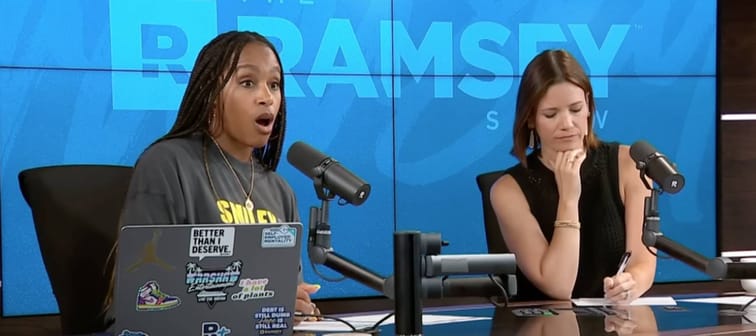The Ramsey Show says it’s better to owe a bank than the IRS
Marty has a few ways to come up with the money: He could use a line of credit like a HELOC or credit card, dip into his $60,000 in savings, or take out a personal loan from a bank. But The Ramsey Show co-hosts Jade Warshaw and Rachel Cruze were clear: some of those options could make things worse. They advised against using a home equity line of credit (HELOC) or a credit card.
“I would not do a HELOC,” Cruze said. “I would not put your home at risk. With HELOCs, the interest rates are sometimes insane.” As for credit cards, the interest rates tend to be even higher and more volatile, and the debt can spiral fast. That’s a dangerous mix when dealing with a large IRS bill. Instead, Warshaw and Cruze recommended pulling from Marty’s savings and using a personal loan from a bank to cover the remainder.
“Use your savings, then get a personal loan to pay the IRS off as quickly as possible,” Warshaw advised.
“Because I’d rather owe a bank than the IRS at this point,” Cruze added.
IRS debt can lead to aggressive penalties, interest and long wait times when trying to resolve issues — which is why they emphasized handling it quickly, cleanly, and without risking other key assets like retirement accounts or home equity.
“You’re already in the hole,” Cruze said, adding “...be in the hole with a bank.”
Invest in real estate without the headache of being a landlord
Imagine owning a portfolio of thousands of well-managed single family rentals or a collection of cutting-edge industrial warehouses. You can now gain access to a $1B portfolio of income-producing real estate assets designed to deliver long-term growth from the comforts of your couch.
The best part? You don’t have to be a millionaire and can start investing in minutes.
Learn MoreThe consequences of tapping into your 401(k) early
Marty’s story serves as a reminder to avoid dipping into retirement accounts, especially if you don’t fully understand the tax implications.
As Warshaw concluded, “No more leveraging very important things for debt.”
In a financial emergency, your 401(k) might look like a tempting source of fast cash, especially when you see a hefty six-figure balance just sitting there. But taking money out of your 401(k) before age 59½ can come with serious consequences that extend far beyond the immediate tax year. You’re typically hit with a 10% early withdrawal penalty and ordinary income tax on the total amount that you’ve withdrawn.
For example, let’s say you withdraw $20,000 from your 401(k) before age 59½:
- $2,000 goes straight to the IRS as a penalty (10%)
- Assuming a 22% tax bracket, you’ll owe another $4,400 in income taxes
- Total cost in fees and taxes: $6,400, or 32% of your withdrawal
- The amount you’ll actually keep: $13,600
Aside from the fees and taxes, there are long-term implications, too.
Lost investment growth: Money withdrawn from your 401(k) isn’t just taxed, it’s no longer growing. A $20,000 withdrawal today could have grown to $80,000 or more over 25 years with compounding returns (assuming an average of 7% annual growth).
Tax time shock: Many people think taxes and penalties are deducted automatically. But if you don’t withhold the right amount when you take the distribution, you may owe thousands when you file, with penalties and interest if you can't pay on time.
When a 401(k) withdrawal might make sense
There are some exceptions where tapping into your 401(k) early may be the only option:
- Avoiding foreclosure or eviction
- Job loss with no savings or access to credit
- Disability or death (in which case, penalties may be waived)
- Hardship withdrawals, like for terminal illness (may be exempt from the 10% penalty, but you’ll still owe income taxes)
Before dipping into your retirement funds, consider other options:
- Emergency savings
- Personal loans or credit union options
- Home equity loans, if your income supports repayment
- Selling non-retirement investments, like brokerage accounts
Pulling from your 401(k) early can feel like a quick fix, but with taxes, penalties and lost future growth, you could lose 30% to 40% of what you take out, so it should be treated as a last resort rather than an easy solution.
Meet your retirement goals effortlessly
The road to retirement may seem long, but with Advisor.com , you can find a trusted partner to guide you every step of the way
Advisor.com matches you with vetted financial advisors that offer personalized advice to help you to make the right choices, invest wisely, and secure the retirement you've always dreamed of. Start planning early, and get your retirement mapped out today.







